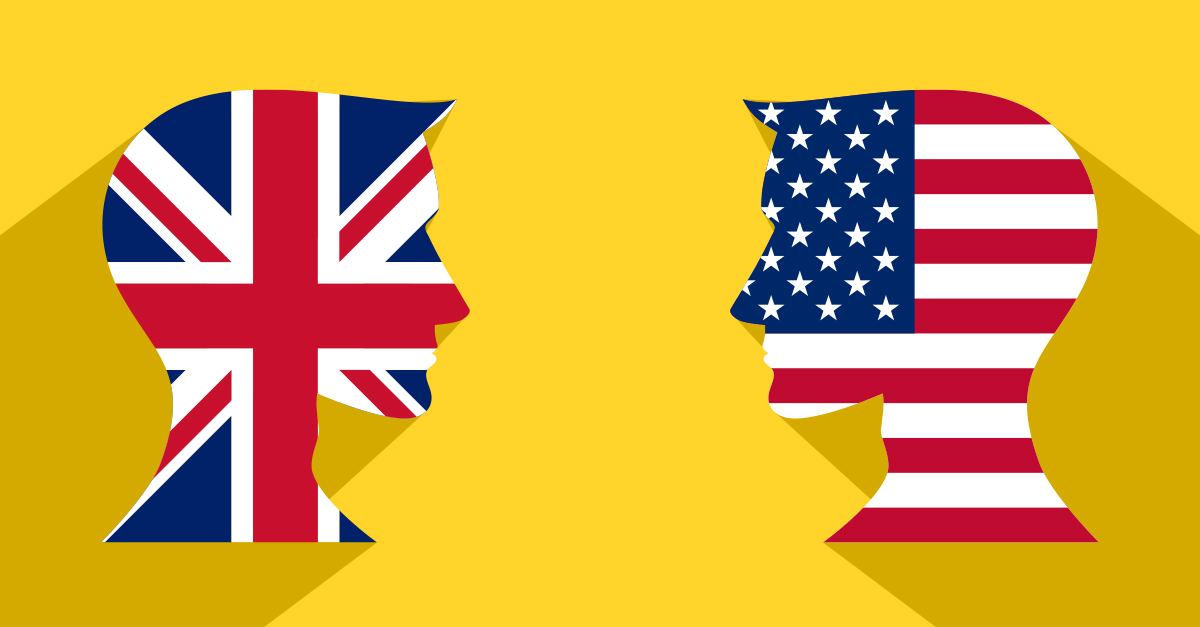
You may have heard the famous quote that the U.S. and Great Britain are “two nations divided by a common language.” But the divide between British English and American English actually affects people from other places, too.
As providers of corporate language training, here’s how we see that play out. In many non-English speaking countries — including China, India and European nations — it’s common for people to learn English in school. Usually, though, that means they’re learning British English.
When someone who has studied British English as a second language later comes to the U.S. to work, they’re often surprised by how much trouble they have understanding others and being understood themselves. Even though they’re proficient in English, they discover that American English is a very different language.
Our goal is to help them understand English as it’s actually spoken in the U.S. and to develop an accent that’s more easily understood by native speakers of American English. Today, let’s take a look at the differences between British English and American English.
We’ll also share a few tips to help English speakers from other countries feel — and sound! — like they were born in the U.S.A.
Vocabulary Differences Between the U.S. and England
If a speaker of U.S. English were in a conversation with a speaker of British English, each would probably understand most of what the other person is saying. However, some common words are different. For example:
- In the U.S., people say “elevator,” while in the U.K., they call this device the “lift.”
- Americans kick back and relax on “vacation,” while Brits get away from it all on “holiday.”
- In the U.S., you might live in an “apartment,” but in the U.K., you’d live in a “flat.”
- Americans wear “pants” and “sweaters,” but Brits wear “trousers” and “jumpers.”
These are just a few examples of the many vocabulary differences between American and British English. When learning American English, it’s important to familiarize yourself with these variations to avoid confusion and communicate effectively.
Spelling Differences Between the U.S. and England
Here’s a difference between U.S. and British English that will be noticeable mainly when you are doing written work. While many words are spelled the same in both varieties of English, there are some exceptions. Luckily, those exceptions tend to follow patterns — and the spelling differences are minor enough not to impede understanding.
- In American English, words like “color,” “flavor,” and “labor” are spelled with “-or,” while in British English, they’re spelled with “-our” (colour, flavour, labour).
- Words ending in “-ize” in American English often end in “-ise” in British English (organize vs. organise, recognize vs. recognise).
- Other words, like “defense” (American) and “defence” (British), have different spellings as well.
Pronunciation Differences Between the U.S. and England
Pronunciation is another area where American and British English diverge. The most well-known difference is probably the “r” sound. In most American accents, the “r” is pronounced in words like “car,” “hard,” and “park.” In many British accents, the “r” is silent in these words unless the next word begins with a vowel sound.
You’ll notice we said “accents” above. If you live in the U.S., you probably already know that there are many kinds of American accents. The same is true in the U.K., even though it’s a much smaller region.
Intonation and stress patterns also vary between the U.S. and the U.K. American English tends to have a more even stress pattern, while British English often puts more emphasis on certain syllables.
At first, you might have to really concentrate to understand the full meaning of English spoken in a different accent. But your ear will probably acclimate quickly. You might even notice that your pronunciations start to change the longer you are in a different language environment.
Grammar Differences Between the U.S. and England
Finally, there are differences in grammar and usage. For instance:
- In American English, collective nouns (like “team” or “company”) are typically — but not always — treated as singular, while in British English, they can be either singular or plural.
- Americans tend to use the simple past tense (“I ate”) more often, while Brits use the present perfect (“I have eaten”) more frequently.
- Some preposition usage differs, such as “on the weekend” (American) vs. “at the weekend” (British).
Master the Differences Between U.S. and British English With Fluency Corp
Learning these differences is key to mastering American English and communicating effectively in the U.S. At Fluency Corp, our experienced instructors can help you navigate the complexities of American English and develop the skills you need to succeed in your professional and personal life in the United States.
If you’re an expat in the U.S. who wants to sound more like a native speaker of American English, we’d love to tell you about our English classes at Fluency Corp. They’re taught by native speakers, and they’re available both in person and online around the globe. If you’d like to learn more about how our classes work, contact us now.










